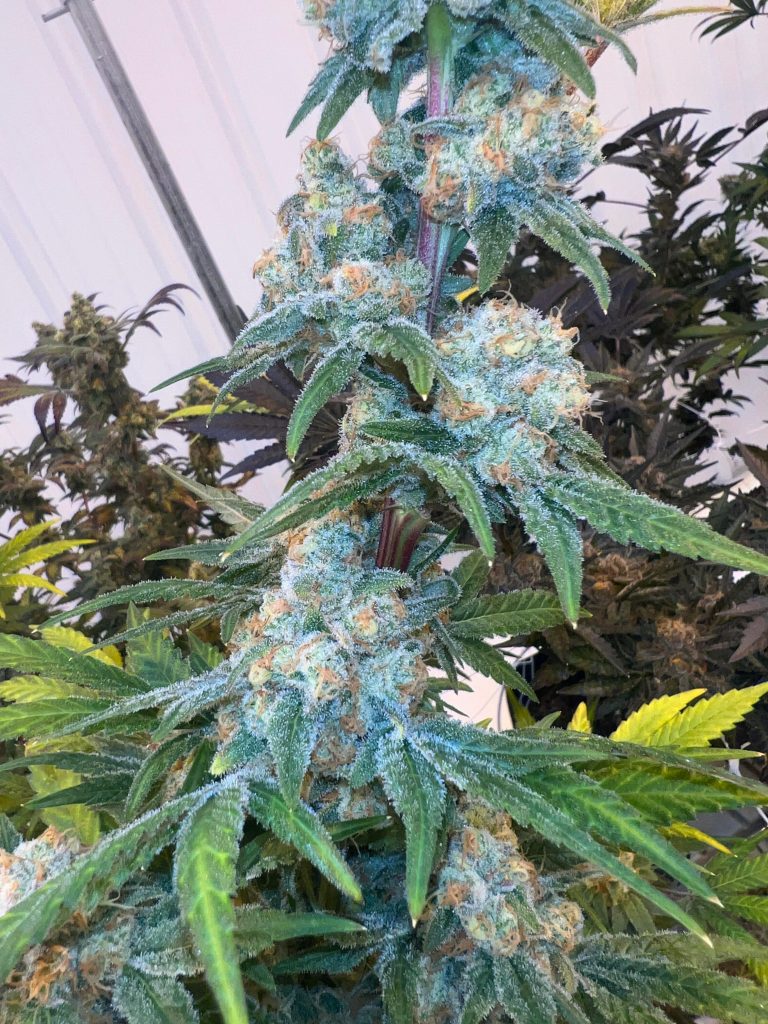Dogs Will Hunt
“Variety is the spice of life,” as the saying goes, and this is no more true than in the world of cannabis strains. It’s so appealing to wake up in the morning and know that you’re about to grow a plethora of different strains, but waking up to hunt through thousands of untested new strains is priceless!

POSSIBLY THE NEXT GREATLY DESIRED STRAIN IN MICHIGAN MARKET?
Great Lakes Kush, based in Lansing, Michigan, is passionate about their work. They search for needles in haystacks when no one else wants to take the chance of getting pricked. Brian Trimble and Kc Fowler cut their teeth in the Michigan caregiver scene and now hold two class C licenses, spending most of their time popping seeds to conduct massive pheno hunts. After watching them for a couple of months on their Instagram page, GLK Genetics, I reached out and asked to chat with them.
Pheno hunting is attractive for many reasons, but it can be a tightrope walk in terms of costs and possible exposure to male plant pollen or a female that may herm in week 3 of flowering. I admitted to KC that I thought he was crazy right away in our conversation, and after a quick 90 minutes on the phone talking plants, I scheduled a visit to their facility.
I broke down the costs of pheno hunting in a prior post, and it’s not for the faint-hearted or newbies to attempt. This is where GLK comes to your rescue, doing the work. You just select from their pre-screened tested select cuts. GLK conducts real hunts to find those rare plants that set trends in the cannabis market. It’s hard to explain what it feels like to walk down the aisles of 4000 seeds on day 63 of flowering, finishing up. For me, it’s similar to Christmas morning when I was seven years old.
GREAT LAKES KUSH OF LANSING MICHIGAN PHENO ROOM
Kc explained that during their first few pheno hunts, they learned that it is a very diligent and stressful task to pull males. Checking every single plant multiple times a day is required to prevent pollination. Many genetics today are extremely intersex-prone, and this necessitates constant vigilance and sifting of genetic stock. Collecting as much data as possible is also critical for developing and determining a truly commercial cultivar. Overall, their first few hunts have been a greatly rewarding investment in developing their own unique cultivars.
Regarding their Watermelon Jolly Rancher male, it came from a cross of Rasol Village Landrace and a Mazar Afghan stud from their Vermont colleagues, Mateo and Connor of Terminal Genetics. They open-pollinated several landraces together, hunted the ensuing plants, and found one that smelled like watermelon Jolly Ranchers upon touching it. They used this stud to pollinate some clones, including a few different Sherb crosses and a skittles cross. Florida Cory, one of the breeders in their collective, then hunted these crosses, and they realized that something special may have happened. The hunt in their facility of these crosses has yielded the most diverse expressions and incredible smells. They have noticed a heightened Sherb/Z terp throughout the populations with outlier cultivars that wreak of passionfruit and watermelons.
It was exciting to walk the pheno hunt room bursting with flavor after flavor and some of the largest colas seen. GLK Genetics has chosen a amazing journey, and there will be a follow-up to this introductory review after the surmise of what this hunt may have unleashed on the licensed Michigan market.
GLK Genetics, will be doing an extensive Scapegoat Genetics hunt soon of a few strains, and I wanted to be totally transparent about it.
According to Kc, their next plan is to hunt GMO crosses and run some production tables of their keeper Black Mango Piff F2 phenos, which is an 8 week sativa varietal they bred. After that, they will be hunting Scapegoat Genetics and Clonefam’s beans, which will include lots of Sherb and Z terps coming down the pipeline, along with some stinky gas varietals.
Kc stated that they are very serious about culling plants that do not cut it. Brian, their business partner, does not allow Kc to handle the seed plants because they are likely to kill everything. They prefer to run every seed out unless it is a runted or weak plant, which often shows intersex traits and is hermaphroditic anyway. They do not contribute to the bottlenecking of gene pools. They employ very heavy culling techniques, and anything that shows intersex traits is killed in their facility.
Kc describes navigating relationships in the Michigan market as interesting, especially as price compression has advanced in the past year. They prefer to work with legacy individuals who have a proven track record of trust and respect. They acknowledge that there are many people in the industry who care solely about money, but for them, the advancement of the cannabis plant is at the heart of their principles, and they strive to maintain a balance. Their business relationships often turn into great friendships, and they firmly believe in the motto: “Teamwork makes the dreamwork.”
Again I can’t tell you how much I enjoyed touring GLK Genetics facility and will be talking about them on the regular I have a feeling.
 0
0